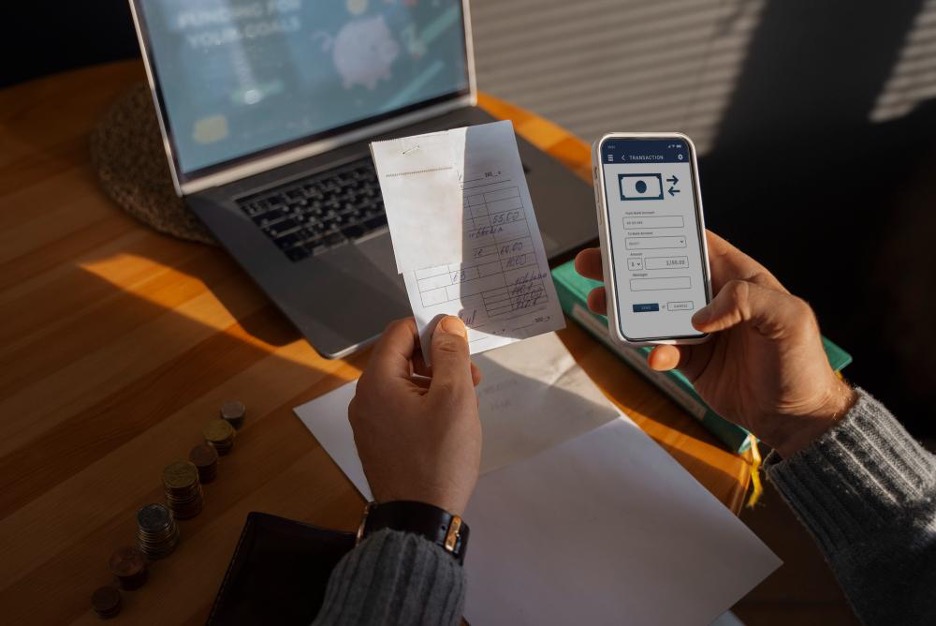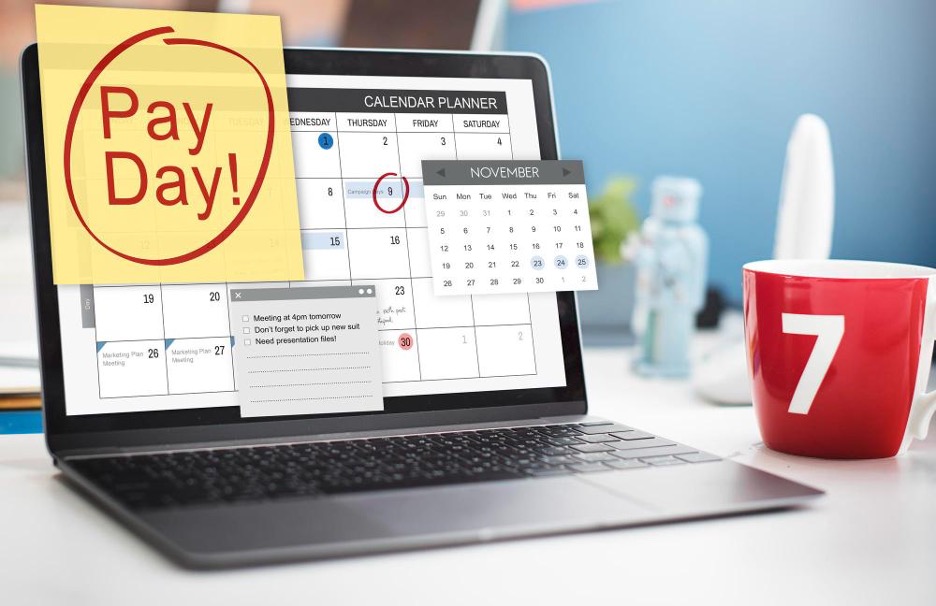
Most direct deposits arrive between 12 a.m. and 6 a.m. on payday, though the exact time your money becomes available depends on your bank’s posting schedule, your employer’s payroll timing, and the ACH (Automated Clearing House) system.
This guide reflects the latest ACH processing rules, banking practices, and early deposit options offered by digital platforms.
What Is Direct Deposit and How Does It Work?
Direct deposit is a method of electronically transferring funds directly into a bank account. It's a fast, secure, and paperless way to receive payments, most commonly used by employers to pay wages, but also used by government agencies for benefits and refunds.
Behind the scenes, direct deposits rely on the Automated Clearing House (ACH), a U.S. network that processes electronic payments. Here's how the process works:
- Employer Submits Payroll Data: Your employer sends a payment file to their bank, listing all employees, payment amounts, and destination accounts.
- Bank Sends to ACH Operator: The employer’s bank forwards the file to an ACH operator, such as the Federal Reserve or The Clearing House.
- ACH Processes the File: Payments are sorted and validated, then routed to each recipient’s bank.
- Bank Posts the Funds: Once your bank receives the payment, it credits your account, often before business hours begin on payday.
This system ensures funds move securely and efficiently, often days before payday to ensure timely delivery.
Typical Direct Deposit Times (By Bank & Platform)
Direct deposit posting times vary slightly depending on your financial institution’s processing method. While some banks operate in real-time, others use batch processing windows during early morning hours.
Below is a general guide to when direct deposits typically hit based on public data and user reports:
| Bank / Platform | Typical Deposit Time | Notes |
| Chime | 12 a.m. – 5 a.m. (2 days early) | Early pay supported |
| Wells Fargo | 4 a.m. – 6 a.m. | Early Pay available for select accounts |
| Bank of America | 4 a.m. – 8 a.m. | Standard ACH posting |
| Cash App | 12 a.m. – 6 a.m. | Offers early direct deposit |
| Chase | 3 a.m. – 6 a.m. | ACH batches processed before 6 a.m. |
| PayPal | 3 a.m. – 7 a.m. | May vary based on funding source |
| Varo | 12 a.m. – 5 a.m. (2 days early) | Early pay supported |
| Credit Unions | Varies by institution | Often posts during business hours |
ACH does not process transactions on weekends or federal holidays. If your payday falls on such a day, the deposit typically arrives the previous business day or the following Monday.
Early Direct Deposit – Who Offers It in 2025?
Early direct deposit allows you to receive your paycheck up to two days before your official payday, depending on your employer and banking provider.
This feature has grown in popularity, and as of 2025, several major platforms offer it, including:
- Chime
- Varo
- Cash App
- EarnIn
- Wells Fargo (via Early Pay Day)
- Wisely by ADP
These banks release your paycheck as soon as they receive an ACH payment notification, even before the funds have technically “cleared.” This means if your employer submits payroll on a Tuesday for a Friday payday, you might see the money by Wednesday morning.
Early deposit availability depends on both your employer’s submission schedule and your bank’s policies, so results may vary.
Why Your Direct Deposit Might Be Delayed
Even though most direct deposits hit early in the morning, delays can still occur. Here are the most common reasons:
ACH Blackout Periods: The ACH network doesn’t operate on Saturdays, Sundays, or federal holidays. If your scheduled payday lands on a non-processing day, your deposit may arrive on the preceding Friday or the following business day.
Employer Payroll Cutoffs: Employers must submit payroll files in advance. If your company submits late or makes an error, your deposit can be delayed.
Bank-Specific Holds or Review: Some banks may place temporary holds for security or compliance reasons, especially if the deposit amount is large or your account is new.
Account Issues: Incorrect account or routing numbers, recently changed bank details, or flagged transactions can also cause a delay.
Understanding these factors can help you anticipate potential issues and know when to follow up with your employer or bank.
Direct Deposit for Government Payments and SSI
If you receive government-issued payments such as Social Security, SSI, veterans' benefits, or IRS tax refunds, your direct deposit may follow a slightly different schedule than standard payroll.
These payments are still processed through the ACH network, but the timing depends on:
- The agency’s disbursement calendar
- Whether your bank allows early access
- The day of the week your benefit is scheduled
For instance, Social Security benefits are typically post on the second, third, or fourth Wednesday of each month, depending on your birth date. If the scheduled date falls on a weekend or holiday, your payment is usually deposited on the preceding business day.
Some banks, such as Chime, Varo, and NetSpend, allow early access to these government payments, sometimes up to five days in advance, depending on when the ACH file is received.
Direct Deposit Without a Bank Account: Using Pay Cards
You don’t need a traditional checking account to take advantage of direct deposit. Many employers offer pay cards, which are reloadable prepaid debit cards that function similarly to bank accounts.
Here’s how they work:
- Your employer deposits your paycheck onto the card electronically
- You can use the card for purchases, ATM withdrawals, or online payments
- Some pay cards also offer mobile apps and direct deposit tracking
Pay cards are popular among workers without bank accounts or those who prefer not to use personal banking for payroll. However, it’s important to note that some cards charge fees for ATM withdrawals, inactivity, or balance inquiries.
Before accepting a pay card, check for:
- Monthly maintenance fees
- ATM access and limits
- Free withdrawal options (e.g., one per pay period)
Despite the potential fees, pay cards remain a practical option for accessing funds quickly and securely.
Tools to Track and Plan Your Direct Deposit
To stay ahead of delays and better manage your cash flow, use the following tools and resources:
- Bank Mobile Apps: Most major banks offer deposit alerts and ACH status tracking.
- ACH Calendars: Review ACH cutoff and processing schedules, especially around federal holidays.
- Payday Calculators: Use an online calculator to predict when your deposit will land based on your payroll cycle and bank.
- Early Deposit Eligibility Checkers: Platforms like EarnIn or Chime let you see if you're eligible for early pay based on employer setup.
Tracking tools can be especially helpful for gig workers, freelancers, and those relying on multiple income streams.
How to Set Up Direct Deposit the Right Way
Setting up direct deposit is usually a quick process, whether you’re starting a new job or switching banks. Here’s how to do it correctly to avoid payment delays.
Step 1: Get Your Bank Information
You’ll need:
- Your bank’s routing number
- Your checking or savings account number
- A voided check, if required by your employer
Step 2: Fill Out a Direct Deposit Form
Most employers will give you a direct deposit authorization form. You’ll enter your account details and specify how much of your paycheck should go to each account (if splitting funds).
Step 3: Choose How to Allocate Your Funds
You can choose to:
- Deposit 100% of your pay into checking
- Split your pay between checking and savings
- Send a portion to an investment account or retirement plan
Step 4: Submit and Confirm
Return the completed form to your payroll or HR department. It may take one or two pay cycles for the direct deposit to start, so plan for that delay.
Tip: Double-check that your account numbers are correct to avoid failed payments.
Final Tips to Ensure You Never Miss a Direct Deposit
- Use Alerts: Set up mobile banking notifications so you know the moment a deposit hits your account.
- Plan Around Holidays: Know when the ACH network pauses processing, deposits may come earlier or later than usual.
- Keep Information Updated: If you change banks or accounts, update your payroll information immediately.
- Use Early Deposit Features: Choose banks or platforms that allow early ACH releases to access your money faster.
- Monitor Pay Schedules: Ask your employer for the payroll schedule so you can anticipate paydays accurately.
Staying informed about how direct deposit works and understanding the timing behind it can help you manage your finances more confidently, whether you’re a full-time employee, a gig worker, or receiving government benefits.
Common Questions About Direct Deposit (FAQs)
What time does direct deposit hit my account?
Most direct deposits post between midnight and 6 a.m. on payday, though it can vary depending on your bank’s processing schedule and when the funds are received.
Can I get my paycheck two days early?
Yes. Some banks offer early direct deposit by crediting your account as soon as they receive notification from your employer, often up to two days before your official payday.
Why didn’t I get paid today?
Check if your payday falls on a weekend or holiday, verify your account info with your employer, and ensure there are no bank holds or delays.
Do all banks post deposits at the same time?
No. Each bank or credit union has its own posting schedule. Some process ACH batches overnight, while others post in real time during business hours.
Do government benefits hit at the same time as paychecks?
Not always. Government agencies follow separate disbursement calendars. Some banks allow early access to these funds depending on when the ACH is received.
Get help with your refund
"This app saved me
$127 in minutes"





.svg)
.png)


